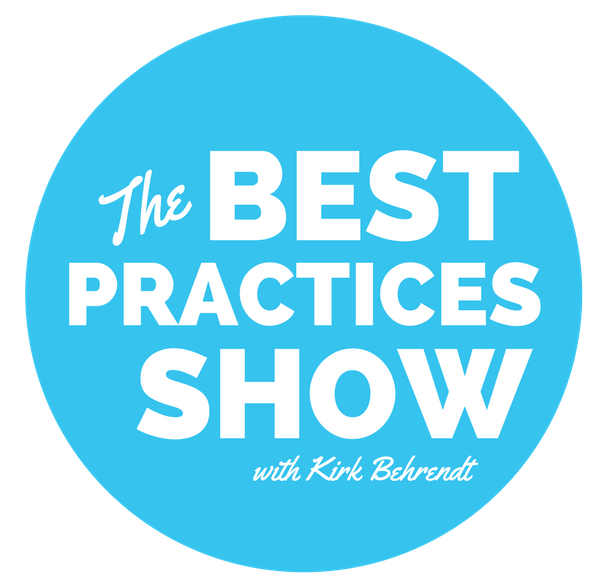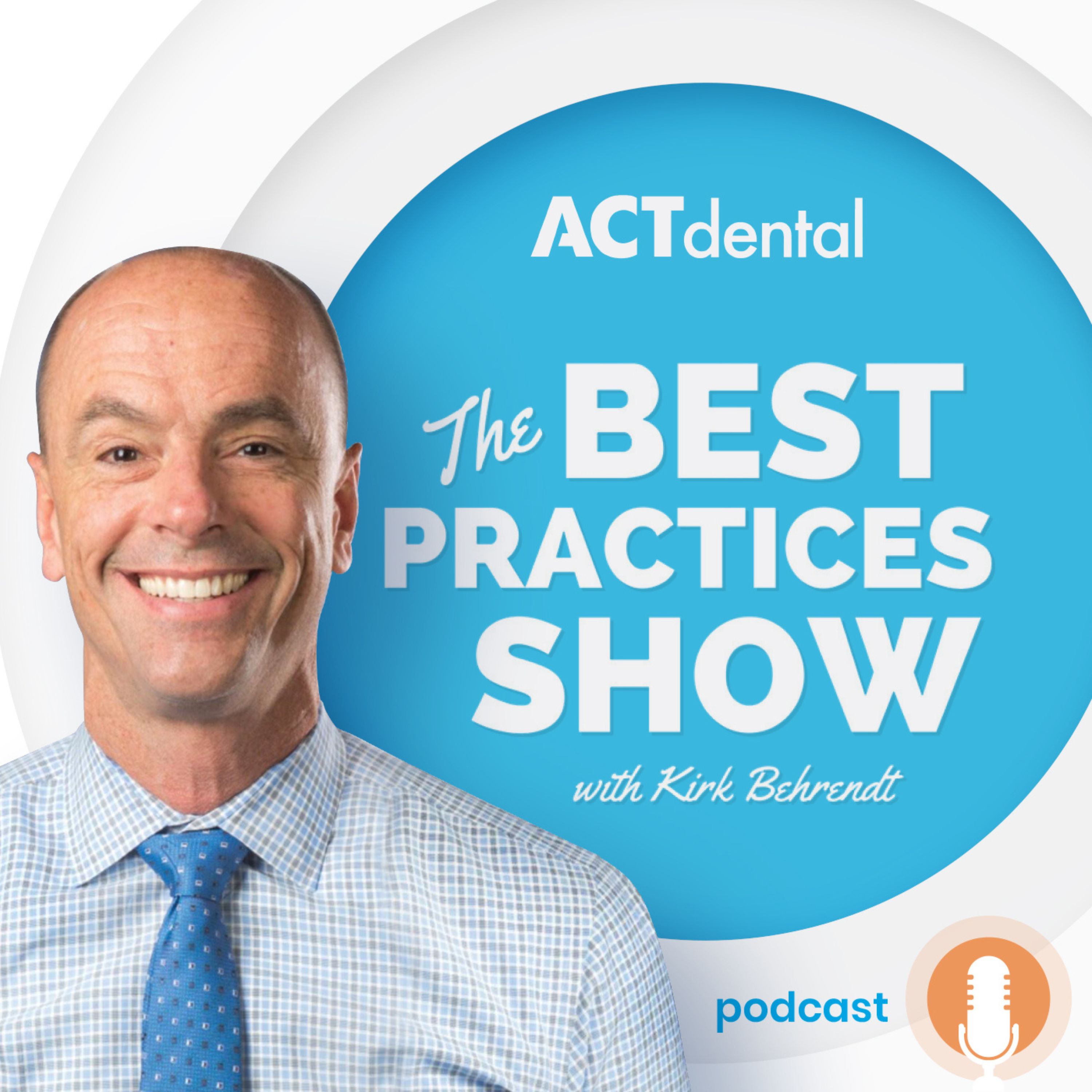Episode 423
423: Hiring, Finding, and Keeping Great Team Members - Kevin Henry
Hiring, Finding, and Keeping Great Team Members
Episode #423 with Kevin Henry
Great team members are hard to come by. And even if you find them, how do you keep them in your office? It’s becoming harder than ever, so Kirk Behrendt brings in Kevin Henry, co-founder of IgniteDA, to share his findings for the best practices to find, hire, and keep great people. Patience is one key ingredient — and you will need lots of it! For more expert advice on keeping the best team members, listen to Episode 423 of The Best Practices Show!
Main Takeaways:
Branch out into other industries to find great people.
Have patience. Finding the right person takes time.
Start having “stay” interviews, not exit interviews.
Play to your team members’ strengths and talents.
Create a space where you have mutual respect.
Ensure that your team members feel listened to.
Always thank and recognize your team members.
Find ways to incorporate fun into your practice.
Quotes:
“We’ve got to quit having exit interviews and we’ve got to start having stay interviews. We’ve got to start talking to our team members right now about their goals, their hopes, what they like, and have those open and honest conversations about what they don't like in the practice as well, what's that one system in the practice that's tripping them up every day that they dread coming in because of that. I think when we have those open, honest conversations and those team members hear that we’re actually interested in not only fixing and tweaking those problems but also how they can be a part of things moving forward, and that they are really a part of the plan, that changes the dynamic in the practice completely.” (5:30—6:07)
“Set up a time, and it’s not the end of the day, when you and a team member — and I think it should be a one-on-one. I don't think it should be everybody sitting around the room — where you both can really focus on things. You both can take notes. You both can put aside the phone, everything else, and just say, ‘What can we do to make each other better? What can we both do together to make this business better?’ Because, as you know, it’s not just a dental practice, it’s a business. How do you grow that bottom line together?” (6:29—6:55)
“[Ask team members,] ‘Where do you see yourself in six months? Is this what you love to do? If not, why?’ I think things like that where you can actually open up the door for honest communication — and let's be honest, not every team member is going to want to share this. Not everybody is comfortable sharing where they're not happy in the practice. But I think if you really set that, ‘This is a safe zone. This is Vegas. What happens in here, stays here. But we’re also going to do what we can to move forward,’ I think that that's a really important thing for team members to know that they can talk openly and freely, and that it’s not going to be held against them two weeks later.” (7:28—8:05)
“One of the biggest things that I'm hearing from a lot of team members out there — I've seen it — people throwing money at people to stay. And it turns into a bidding war. And I will tell you, the vast majority of team members I talk to, it’s not about the money. It is about being happy. It’s about being productive. It’s about feeling like you're part of the team.” (8:16—8:38)
“I don't think you have to like everybody you work with. But I think you've got to respect everybody that you work with. And I think there has to be that mutual respect in the practice as well. So, what are you doing in the practice to build those relationships where people don't look at somebody as “just” an assistant or “just” a sterilization tech, or whatever it might be? And I think whenever you build up that mutual respect in the practice, that's a big step toward those people going, ‘This is a place where I want to stay.’” (8:43—9:11)
“[When a great team member is thinking about leaving,] you've got to ask that team member what's important to them. Is it the money, or is it somewhere they can really grow? And I would also ask, what do they really know about that practice other than they're willing to throw a couple extra bucks an hour your way. And I will tell you, I speak to assistants all over the country, and they come up to me constantly and ask me about moving practices. And I always tell them, ‘Do your homework. Don't just have somebody come to you and say, ‘I'll pay you $20 instead of $18 an hour.’ It’s got to be, are you the right fit? What do they actually do?” (9:29—9:59)
“It’s really interesting to see all the different ways that people are trying to find [team members]. And I would say, absolutely, maybe Indeed isn't it. Maybe it’s more of a dental post that's actually focused on the dental industry. Maybe it’s more of just being at that local meeting and meeting other people. But I think, really, it’s about keeping your head out whenever you're out there at the movie theater, at the restaurant, whatever it might be, somewhere that somebody impresses you with that interaction you had with them. What can you do to maybe talk to them about that interaction being a part of your team?” (11:30—12:04)
“Facebook is not the best place to air your grievances in any way, shape, or form. It doesn't take long for me to click on your profile, find out where you work. I always encourage people, if there's something that you have to say that you need to grind an axe, or whatever it might be, that one-to-one, find somebody in your local community. Find somebody in a local study club, your local assisting society, whatever it might be. But don't go on social media and do it.” (13:43—14:07)
“I want to bring up one thing that is a really disturbing trend. There is a lot of ghosting going on right now in interviews. There are a lot of assistants and hygienists who simply aren't showing up for interviews. And I will tell you, that is as bad of a problem right now as actually finding somebody. So, I want to encourage, unless there was a death in the family or something like that, if somebody ghosts your interview, don't give them a second chance. Don't hire somebody just because they’ve got a heartbeat. You've got to actually make sure that this is the right person. And if they're not going to show up for the first interview and make some kind of excuse about why, that's a red flag for me and a big X.” (15:56—16:35)
“As far as the interview questions, I think it’s really important to see, did they do their homework on you. Ask them what they know about your practice. Ask them what gets their juices going in the morning. What do they look at on the schedule and say, ‘Oh, I love doing this’? And if they tell you they love oral surgery, or they love endodontics — those are few and far between, by the way — but if they say that they love that, start down that road about, ‘Well, what can we do to make sure that you are fulfilled with that, that you learn more about that?’ Play to their strengths. Really make sure that those things that they love to do, they can do more of. But at the same time, you’ve got to ask the tough questions, ‘What's the least favorite part of the day? What are the things that you're not as confident in? And how can we help you gain more confidence if you come onto our team?’” (16:37—17:26)
“You've got to really sit down and think, ‘Is it worse to have this person in my practice, maybe holding things back, maybe not getting us to where we need to be as a team — that one person, is it better to have them on board, or is it better to go through the hiring process right now and try to find that right person?’ And I will argue, more often than not, it’s worth it to let that person go if they're keeping the entire team behind and try to find somebody who actually fits the team culture.” (18:07—18:38)
“It’s possible [to bring people in from outside of dentistry] if you're willing to be patient and you're willing to teach. Now, if those two things are not in your core values and who you are as a person, I absolutely would not do that, because this isn't going to be something that you're going to connect with that new assistant on day one.” (22:02—22:17)
“It’s not just, ‘Well, we’re going to wait till the holidays to have this party.’ How do you incorporate fun every day? How do you make sure that there's something to look forward to other than 5:00 every day? I think that's a really important thing to figure out.” (25:13—25:26)
“There was a time that I did a survey of 1,000 dental assistants. And I asked them two questions: the meanest thing a dentist ever said to you, and the nicest thing a dentist ever said to you. And we won't go into the meanest. That's a whole other four hours. But the nicest thing was overwhelmingly, ‘Thank you.’ And so, that has impacted me to this day, that we’ve got to take the time in the practice, that if somebody turns the room over, if somebody talks a patient off the ledge, whatever it might be, absolutely, make sure that person is recognized just with those two quick words.” (25:47—26:16)
“I think the biggest thing [you need to have] is patience. Because to hire somebody is going to take some time. Rarely, will you find that person on the first interview.” (26:43—26:54)
Snippets:
0:00 Introduction.
1:05 Kevin’s background.
1:52 Why this is an important topic.
3:56 Leadership and communication is more important than ever.
5:26 Where to start in this process.
6:07 Open the door for honest communication.
8:12 Build mutual respect in your practice.
9:00 Ask why a team member is thinking about leaving.
10:16 Where to find great people.
13:20 Thoughts on bashing dentists on social media.
14:30 Best practices on the interview process.
17:41 To fire, or not to fire.
20:05 Update your mission statement.
21:19 Bringing someone in from outside of dentistry.
23:06 Thoughts on keeping great team members.
24:33 Incorporate fun in your practice.
25:43 Thank your team members.
26:37 Have patience.
27:39 Last thoughts.
28:38 IgniteDA and Kevin’s contact information.
Reach Out to Kevin:
Kevin’s website: https://www.kevinspeaksdental.com/
Kevin’s Facebook: https://www.facebook.com/kevin.henry
Kevin’s social media: @kghenry23
Resources:
IgniteDA website: https://ignitedds.com/
For dental assistants: @ignitedentalassistants https://www.instagram.com/ignitedentalassistants/?hl=en
Kevin Henry Bio:
With 16 years in the dental publishing industry, Kevin is the former group editorial director for UBM Medica’s dental division, consisting of: Dental Products Report, Modern Dental Assistant, Dental Practice Management, Digital Esthetics, Modern Hygienist, Modern Dental Business, and more. He was named as one of the top five influential voices in the industry on Twitter (@kgh23).
In Kevin’s former life, he was a public relations director for NAIA, a national small college sports organization. He is currently a beat writer for the Colorado Rockies and the Denver Nuggets. Living in Colorado, Kevin loves to be outdoors, whether it be hiking, skiing, or white-water rafting.


